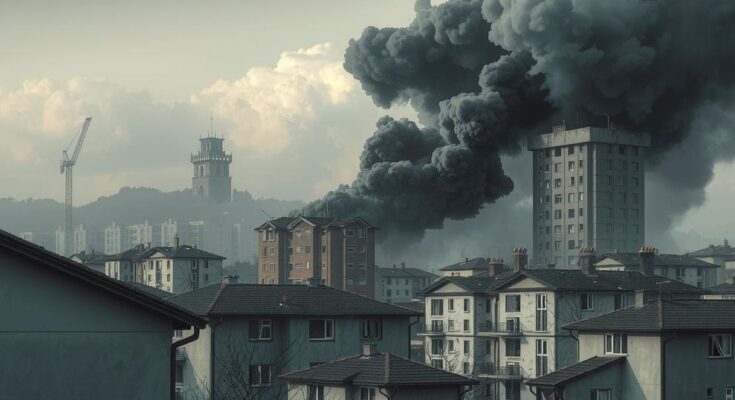Israel has vowed to enforce a ceasefire throughout Lebanon following a rocket attack that prompted airstrikes on Beirut. Lebanese officials have condemned the strikes as a significant escalation, while international leaders call for restraint and investigation into the situation. The Israeli military continues targeting Hezbollah, while tensions remain high in the aftermath of these exchanges.
On Friday, Israel declared its intent to enforce a ceasefire throughout Lebanon following rocket fire that led to airstrikes on Beirut, marking the first assault on the capital since the fragile truce with Hezbollah was established four months ago. Lebanese Prime Minister Nawaf Salam condemned the strikes as a significant escalation, while French President Emmanuel Macron termed them an “unacceptable” violation of the truce.
Despite no casualties reported from the bombing in Beirut, five individuals lost their lives due to Israeli strikes in southern Lebanon. This incident represented the second rocket launch toward Israel from Lebanon since the ceasefire began in November, with Hezbollah once again denying responsibility for the aggression. Israeli Prime Minister Benjamin Netanyahu stated, “The equation has changed,” emphasizing a commitment to enforce the ceasefire using military force whenever necessary.
Israeli Defense Minister Israel Katz articulated that there would be no peace in Beirut if tranquility is not achieved in northern Israel. Following the ceasefire, Israel has continued targeted airstrikes in southern and eastern Lebanon against perceived violations attributed to Hezbollah. The recent attack focused on a site believed to be storing UAVs utilized by Hezbollah’s Aerial Unit in the Dahieh area, a significant Hezbollah stronghold.
Lebanese President Joseph Aoun indicated that while an investigation should occur, initial assessments suggest Hezbollah’s non-involvement in the recent rocket fire. Observers reported extensive destruction in the targeted area, leading to widespread panic among residents as they fled the escalating conflict, with some expressing fears of a return to war.
The Israeli military reported intercepting one of two projectiles launched at Israel, while later operations targeted Hezbollah leadership and infrastructure in southern Lebanon. Hezbollah reaffirmed its respect for the ceasefire agreement and denied its connection to the rocket launch. Under the ceasefire terms, Israel was expected to withdraw its troops from Lebanon by mid-February, but has remained in strategic locations, and the Lebanese army has mobilized in response.
Salam directed military authorities to swiftly identify and apprehend those responsible for the rocket attacks threatening Lebanon’s stability, while communicating with international officials, including the U.S. Deputy Special Envoy to the Middle East. The United States, along with France, is overseeing the ceasefire agreement.
In a press conference in Paris, President Macron emphasized his planned discussions with U.S. President Donald Trump and Prime Minister Netanyahu regarding the Israeli strikes, asserting that there were no justifiable grounds for such military actions. The Lebanese National News Agency reported additional bombings across southern Lebanon resulting in several casualties. UN special envoy Jeanine Hennis-Plasschaert expressed deep concern over the exchanges of fire, urging restraint from all parties to prevent escalations into broader conflict.
Israel’s recent military operations in Lebanon, initiated in response to rocket fire, heighten tensions amid an ongoing ceasefire with Hezbollah. The Israeli leadership emphasizes a rigid enforcement of the ceasefire, asserting their readiness to take military action wherever necessary. Meanwhile, international responses indicate a strong push for stability and a thorough investigation into the rocket attacks, underscoring urgent diplomatic efforts to maintain peace in the region.
Original Source: www.al-monitor.com




